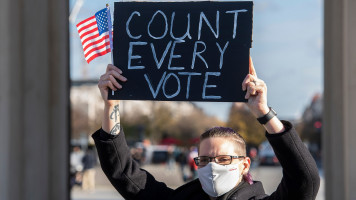Lebanese lira drops to new low as freefall continues post-elections
The Lebanese lira plunged to below 34,000 lira per dollar on Tuesday, an all-time low for the country's currency.
The lira's slide began anew on elections day, 15 May, and continued to decline over the next 10 days.
Gas prices also rose in tandem with the currency's declining purchasing power. The government set the 20 litres of petrol at 588,000 Lebanese lira (US$17.24) on Tuesday or at about 87 per cent of the monthly minimum wage.
Bread shortages were reported in different parts of the country earlier in the week, with bread being sold in the country's south for three times the normal price as flour stocks diminished.
The lira had previously hit 34,000 per dollar at the turn of the year, but the intervention of the Lebanese Central Bank (BDL) helped stabilise the currency in the months up to the election.
BDL used deposits to inject an unknown amount of dollars into the Lebanese economy, in turn helping keep the exchange rate down at a hefty price.
The dollar injection program stopped post-election, and as a result, the currency has suffered.
According to the latest balance sheets of the BDL, foreign currency reserves have dropped below US$10 billion. A year earlier, the central bank governor said that foreign reserves should not dip below US$15 billion.
Lebanon's system of subsidies, funding cheaper flour and medicine among other goods, is funded by BDL's reserves. Importers receive dollars at a preferential exchange rate from BDL for subsidised goods.
Importers have also complained in the past that the BDL had been slow in supplying them with subsidised dollars, producing shortages for vulnerable Lebanese who cannot afford unsubsidised bread or medicine.
Declining foreign exchange threatens the ability of the central bank to continue to prop up this importation scheme.
Lebanon's currency had been pegged at a rate of 1,500 lira to the dollar since 1997, but the 2019 financial crisis caused a sharp devaluation in the currency. The resulting loss of purchasing power has seen Lebanese's savings and wages lose up to 95 per cent of their value.
Since 2019, the country has been embroiled in what the World Bank has described as one of the world's worst economic crises since 1850.
The incoming government is tasked with passing sorely needed reforms to secure a bailout from the IMF. However, analysts have suggested that the parliament's new balance of power could easily result in gridlock and threaten the passage of new economic reforms.





 Follow the Middle East's top stories in English at The New Arab on Google News
Follow the Middle East's top stories in English at The New Arab on Google News


![Algeciras port [Getty]](/sites/default/files/styles/image_330x185/public/75377010.jpeg?h=327453ef&itok=KfCFUEza)